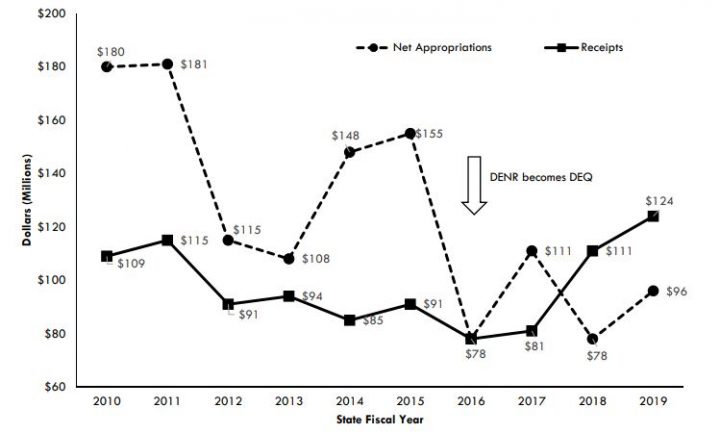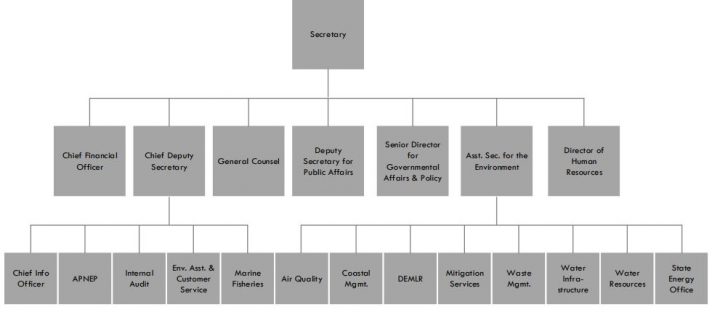
RALEIGH — Legislators want to see the Department of Environmental Quality further streamlined and turning around permits faster but were warned this week that both tasks will be difficult at current funding levels.
A deep dive into permitting turnaround times and the layers of bureaucracy at DEQ released Monday revealed both the complexities and challenges as the department’s mission has been altered in the past few years as the North Carolina General Assembly has removed major divisions from DEQ to other departments to make DEQ more strictly a regulatory agency.
Supporter Spotlight
The report from the legislature’s Program Evaluation Division analyzed DEQ’s permitting processes as well as a department-wide review of its management.
It found that five areas within the department including the Division of Marine Fisheries, one of its largest, have the fewest number of employees per managers and more institutional layers.

The report also looked at DEQ’s ongoing efforts to streamline its permitting process, and while it finds that DEQ has taken significant strides in improving the permitting process since the launch by Secretary Michael Regan of its Permitting Transformation Project, it still lacks an adequate permit performance management system and an overall business plan that tracks the results of changes.
In a review Monday of the report findings and potential legislation for next year’s short session, members of the General Assembly’s Joint Legislative Program Evaluation Oversight Committee noted that the department has made strides in the past two years, but pressed DEQ to push forward with the permit tracking program and the administrative changes to reduce organizational layers.
Joy Hicks, senior director for governmental affairs and policy for DEQ, told legislators that the department had made major structural changes since the state’s last major review in 2016.
Supporter Spotlight
“We’re not the same agency we were in 2016,” Hicks said.
She said efforts to change, particularly those to improve its permitting systems, have been hampered by a lack of funding.
DEQ has unsuccessfully sought funding from the legislature for additional personnel to help clear permit backlogs and improve service since 2017.
The department issues roughly 25,000 permits each year and reviews applications for more than 200 different kinds of permits.
This year, DEQ’s funding has been caught up in the ongoing budget impasse between the Cooper administration and the General Assembly and is not one of the departments included in a series of minibudgets passed before the legislature adjourned for the year. That’s frozen much of the department’s spending at last year’s levels.
The legislature has also consistently trimmed down recent requests by the department for additional funding to cover additional testing and studies on emerging contaminants such as GenX and related compounds.

Hicks said that’s had an impact the ability to process permits, especially in the Wilmington office, where the DEQ technical staff must balance ongoing permit applications with the need to keep up with issues around coal ash and Gen X.
“Right now, you have the same staff doing both,” she said. “Just in this last year, if you think about all the big environmental issues this agency has had to grapple with, it has all fallen back on the same staff.”
In a letter responding to the report, DEQ Assistant Secretary Sheila Holman responded to concerns about staffing levels, saying that in some cases the ratio of managers to employees is higher by necessity in many of DEQ’s technical operations.
“As an example, the report notes a larger staff and more organizational layers occur at the Manteo office – a factor reflective of the fishing and law enforcement activity for the area as well as the remoteness of the Outer Banks, both requiring more staff,” Holman wrote.
Holman said the issues brought up with the Division of Marine Fisheries, including the complexity of the Manteo office, would likely be resolved after some anticipated retirements and restructuring.
At Monday’s meeting, Sen. Chuck Edwards, R-Henderson, said he wants to see the department spell out what it needs to improve the permit programs.
Sen. Andy Wells, R-Catawba, said he didn’t think the changes required should be that difficult to put in place because it only represents about a quarter of the agency, Wells demanded to know when he would see a report on changes proposed for the division.
“Getting that 25% in line shouldn’t be that much of a challenge,” he said.
When the Program Evaluation Division Oversight Committee returns in January, members will likely take up legislation aimed at DEQ’s permitting and management structure raised in the report.
A draft of the bill would require the department to conduct a management study of the Division of Marine Fisheries, the Division of Mitigation Services, the Office of Environmental Education and Public Affairs and its Financial Services and Human Resources units. It would also require development of a formal business plan for the permitting initiative and call for a department study of the issue to be filed with the legislature by May 1 of next year.
Hicks told legislators that given limited resources, the report requirement could delay implementation of what the legislature demands.
Sharon Martin, DEQ’s deputy secretary for public affairs, said the department is already working to meet the goals set out in the study.
“For years, DEQ has had to maximize efficiencies, to do more with less, due to budget cuts and staff reductions and is underfunded and understaffed, even as we try to meet the goals laid out by the Program Evaluation Division,” she said Thursday.
Ports legislation considered
Also on Monday, the committee approved legislation based on a recent evaluation of the efficiency and effectiveness of the state ports at Wilmington and Morehead City.
The legislation that is likely to be introduced during the 2020 short session requires the State Ports Authority to include measures to address port utilization, throughput, gate times and ship turnaround times at Morehead City and revises current law requiring container services at both ports to give the authority the option to decide whether container services are provided.







